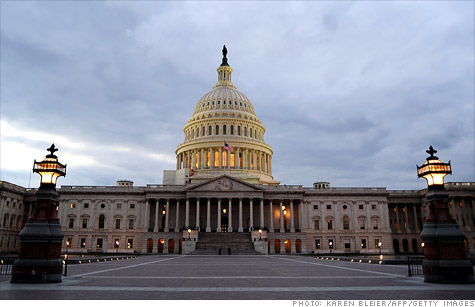Search News

Many expect lawmakers to wait until the last minute to address the sudden onset of tax increases and spending cuts, which is far from ideal.
NEW YORK (CNNMoney) -- Federal Reserve Chairman Ben Bernanke didn't mince words in warning Congress last week that the Fed won't be able to undo the damage to the economy that would occur if lawmakers mismanage the so-called fiscal cliff.
That cliff amounts to $7 trillion worth of tax increases and spending cuts that will be triggered by year's end. (The $7 trillion fiscal cliff)
"[I]f no action were to be taken, the size of the fiscal cliff is such that there's I think absolutely no chance that the Federal Reserve ... could or would have any ability whatsoever to offset ... that effect on the economy," Bernanke said.
Translation: Don't blow it, Congress.
The most potentially damaging options open to lawmakers are the most extreme and also least likely.
They could let all the scheduled tax hikes and spending cuts go into effect, snuffing out the economic growth expected for 2013.
Or they could cancel all the tax increases and spending cuts, adding more than $5 trillion to the debt over a decade and inviting more U.S. credit downgrades.
What's more likely, observers say, is that lawmakers will split the difference, temporarily extending the tax cuts and postponing some or all of the spending cuts.
Whether they can do so before Dec. 31, however, is not at all clear.
"It's not obvious to me you can easily resolve this. The real issue is what can they agree on?" said economist Pete Davis, a former Capitol Hill staffer who now runs Davis Capital Investment Ideas.
And what lawmakers can agree on will be heavily influenced by which parties win control of the White House, Senate and House in November. Indeed, lawmakers aren't expected to seriously negotiate a way off the fiscal cliff until after the Nov. 6 elections.
In theory, that gives them seven weeks to find a resolution. In reality the chambers will probably be in session for less time than that.
Adding to the stress of the time crunch could be considerable din from two other issues likely to suck up oxygen this fall.
One is the budget for fiscal year 2013, which starts Oct. 1. If disagreement between the House and Senate over spending levels isn't resolved, Congress will have to pass short-term spending bills known as continuing resolutions to keep the government's lights on past Oct. 1. And there well could be fights over those CRs.
Another is the debt ceiling. The country's debt likely will kiss up to the legal limit in late fall. The Treasury can buy some time to keep the debt just below the limit, but Congress will probably have to raise it by early next year. And that's always a politically fractious debate.
No matter how you look at it, it's hard to see how any of this ends pretty.
But there are degrees of ugly that could be avoided.
Davis believes lawmakers should simply agree by September to extend all the tax cuts and delay the scheduled spending cuts until February or so, and let the incoming Congress handle the broader decisions.
Longtime budget expert Stan Collender would go a bit further. He'd like Congress to extend the tax cuts, delay the spending cuts and increase the debt ceiling long enough to get the country through Dec. 31, 2013. He'd also like lawmakers to pass a continuing resolution for all of fiscal 2013.
And ideally, Collender said, Congress would accomplish all this by July 31 -- or Oct. 1 at the latest -- and then agree not to return to work until Jan. 3, 2013.
Economist Mark Zandi of Moody's Analytics is expecting that lawmakers will ultimately resolve the fiscal cliff issue for 2013 by extending the Bush tax cuts for everyone but high-income households, and delay about half of the $1 trillion in scheduled spending cuts.
Rather than split the baby on present-day policies, budget hawks like those at the Committee for a Responsible Federal Budget would much prefer if both parties used the fiscal cliff challenge to come up with a plan that "balances short-term economic vulnerability with long-term fiscal sustainability." In other words, a so-called grand bargain -- one that stabilizes the country's debt by reforming the tax code and entitlement programs.
But all signs currently suggest that may still be a ways off. ![]()
| Overnight Avg Rate | Latest | Change | Last Week |
|---|---|---|---|
| 30 yr fixed | 3.80% | 3.88% | |
| 15 yr fixed | 3.20% | 3.23% | |
| 5/1 ARM | 3.84% | 3.88% | |
| 30 yr refi | 3.82% | 3.93% | |
| 15 yr refi | 3.20% | 3.23% |
Today's featured rates:
| Latest Report | Next Update |
|---|---|
| Home prices | Aug 28 |
| Consumer confidence | Aug 28 |
| GDP | Aug 29 |
| Manufacturing (ISM) | Sept 4 |
| Jobs | Sept 7 |
| Inflation (CPI) | Sept 14 |
| Retail sales | Sept 14 |